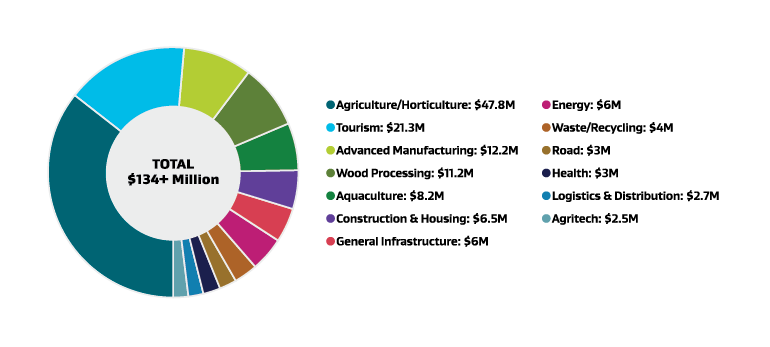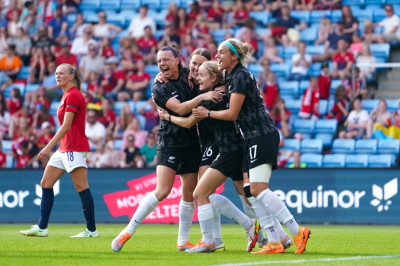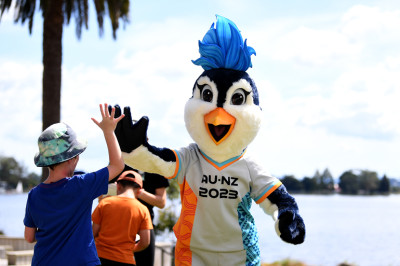Outcome 1: Prosperous and adaptable people, sectors and regions
We deliver a diverse mix of initiatives to help people, sectors and regions thrive and adapt to changing national and global environments.
On this page
Overview
Expenditure
Core responsibilities
In-year initiatives
Our outcomes
Performance measures
A strong and diverse economy, with skilled and adaptable people, is essential to Aotearoa New Zealand’s economic prosperity and wellbeing. In addition to supporting existing activity, we recognise the future will bring shifts in the mix of sectors, jobs and global demand.
MBIE helps regions, businesses and communities grow and diversify their opportunities. We provide a range of core services that underpin economic activity. We work to ensure Aotearoa New Zealand is more resilient to shocks and better placed to adapt to new technologies.
Investing in regions
One way we improve the country’s prosperity and community wellbeing is by investing in regional opportunities. Kānoa managed 7 funds and over 2,700 projects, for a combined total of total of over $4.38 billion.
The sectors supported through these investments span, among others, advanced manufacturing, aquaculture, energy, construction, film, ICT, infrastructure, tourism and training. The aims of the funds include: accelerating regional development, lifting productivity and resilience, boosting employment and skills, and helping regions transition to more sustainable industry options. Kānoa is also focused on social procurement options.
Kānoa aims to achieve a coordinated and integrated investment approach that reflects local interests and opportunities. For example, in Taupō, co-investments in partnership with Taupō District Council, its Airport Authority, local businesses and the community delivered 3 significant projects: the Taupō Town Centre Transformation project, the new Taupō Airport terminal and the Eastern Arterial Shared Path.
These aligned projects have boosted the quality of infrastructure and visitor experience and given employment opportunities to nearly 280 people involved in the construction of the 3 projects.
Regional Strategic Partnership Fund (approved funding by sector)

Data from chart
Business and Economic Research Limited (BERL) gathered information on the impacts of funding in Te Tai Tokerau/Northland and the engineering sector (reflecting investment across multiple funds), plus the manufacturing sector and Te Ara Mahi ‘Pathways to Work’ programme (reflecting investment through the Provincial Growth Fund). BERL calculated that the $797 million invested in Tai Tokerau from 2017 to 2022 generated total economic output of just under $1.2 billion through direct, indirect and induced effects, and an estimated equivalent of over 5,500 full-time equivalents (FTE) over the period. In the manufacturing/engineering sector, BERL calculated that the $79.5 million of funding was estimated to have generated total economic output of $165.5 million and created the equivalent of 1,390 FTEs over the period from 2019 to 2022. Responding to an online survey 88% of businesses reported an increase in permanent employees (of which two-thirds were local), with 84% reporting increased innovation capacity.
The Regional Strategic Partnership Fund of $200 million is one of a portfolio of funds administered by Kānoa.
It focuses on 3 main themes: enabling regional economic and business development, accelerating Māori economic aspirations, and supporting sector transformations. So far over $134 million has been approved through the Regional Strategic Partnership Fund in projects across 13 sectors.
One of the projects is the Toitū Builtsmart Facility in Te Tairāwhiti/Gisborne, which is intended to deliver over 50 much needed homes for Tairāwhiti, create 18 direct full- time jobs, while providing a site for Toitū Tairāwhiti Māori trades training. The project received $4 million to help with the construction of the site, which is now open. The remaining $4 million was provided by Toitū Tairāwhiti.
Seed funding of $6 million is also being invested in pursuing the commercial potential of products like oat milk, through New Zealand Functional Foods, the company established by Southland’s economic development agency, Great South. Oat milk popularity has soared nationally and globally. However, to command a premium price, remain low in emissions and provide the most value to farmers, it should also be processed locally. Funding will support development of a regionally based specialised processing plant, supporting diversified and sustainable farming options, as well as employment.
MBIE also supports regional business development through initiatives such as the Regional Business Partner Network. This provides one-to-one business support, through delivery partners across the country. The network has supported over 5,100 business owners to create tailored action plans and develop their management capability to support the growth of their businesses, in a way that suits them. Through access to local and national tools, advisors connect businesses with support, tools, mentors and training providers to support this. In addition, over 2,200 businesses have accessed management capability funding to improve their management skills.
MBIE also supports the work of 15 Regional Skills Leadership Groups. These independent advisory groups are locally based and regionally led. They identify and support better ways to meet future skills and workforce needs in their regions, both now and in the future, and advise on actions to address these. The groups are part of a joined-up approach to labour market planning that will help the workforce, education and immigration systems work together to better meet the differing skills needs across the motu.
This year, TAS supported thousands of households by finding temporary accommodation following emergencies while their homes were being repaired, rebuilt or if they were unable to return to their homes. When TAS moves into the recovery phase, medium to longer term options, such as apartments, Airbnbs and, in some cases, temporary villages, are set up to make sure households have more stability. One such village was completed in January 2023. This was after the displacement of families following the Westport flooding event in July 2021, which resulted in 315 registrations for TAS. The $17 million village has provided support to the Westport housing supply as the community rebuilds. It also supported the economic recovery of local businesses, with jobs and apprenticeships in the community supporting the building of temporary homes.
Tourism
Prior to the COVID-19 pandemic, tourism was a key export earner for the country. With the full reopening of the border, we have focused efforts on supporting the rebuilding of the sector, including with an emphasis on a more sustainable and regenerative model. While International visitor arrivals across the year were only 65% of those in 2019 (at 2.5 million), international tourism electronic card spends was $3.2 billion, which is approaching 2019 levels. In the domestic market, domestic guest nights have now increased by 17% to 27.2 million and domestic tourism electronic card spend increased by 21% to reach $11.7 billion, when compared to 2019 levels.
Major events
Hosting major events has the potential to generate direct and indirect economic, social and cultural benefits, including showcasing the country and its culture to an international audience. MBIE manages the Major Events Fund, a multiyear fund designed to ensure a pipeline of events is in place. The Rugby World Cup 2021 played in late 2022 (won by the Black Ferns) and the New Zealand SailGP races were 2 events supported through the year.
Significant preparation and support was focused on the FIFA Women’s World Cup Australia & New Zealand 2023™, scheduled for July and August 2023. This event will leave a lasting legacy for the country through things like upgraded sporting facilities and a $10 million leverage and legacy programme designed to grow Aotearoa New Zealand’s economy, raise the profile of women and girls in sport and wider society, support communities to thrive, and enhance international relationships. The tournament was broadcast to a global audience of over 1.5 billion people, providing a unique opportunity to enhance Aotearoa New Zealand’s reputation as a place to visit, do business and host major events.
FIFA Women’s World Cup Australia & New Zealand 2023™
 In 2019, Aotearoa New Zealand won the bid to co-host the FIFA Women’s World Cup 2023™ with Australia. To successfully host an event like this reflects significant work and commitment across multiple years. MBIE, as the lead government agency, was responsible for coordinating the all-of-government effort.
In 2019, Aotearoa New Zealand won the bid to co-host the FIFA Women’s World Cup 2023™ with Australia. To successfully host an event like this reflects significant work and commitment across multiple years. MBIE, as the lead government agency, was responsible for coordinating the all-of-government effort.
One of the main reasons Aotearoa New Zealand bids to host major international events like the FIFA Women’s World Cup is because of the significant and lasting benefits they provide to the country, most notably, the opportunity they present to raise the value and visibility of women and girls in sport and wider society.
Such events shine a spotlight on the nation, bring tens of thousands of international visitors to Aotearoa New Zealand’s shores, and highlight the country’s distinctive culture. For instance, in October 2022, FIFA and 39 qualified teams for the main tournament and playoff tournament were among the manuhiri (guests) at the pōwhiri, led by Ngāti Whātua Ōrākei, for the official tournament draw in Tāmaki Makaurau Auckland.
Throughout 2022/23, a lot of work went into ensuring Aotearoa New Zealand was prepared to co-host the largest women’s sporting event in the world. The work programme had 2 main components: the first focused on operational preparedness and making sure we were able to deliver a successful event. The second focused on how the tournament could be leveraged to create a legacy for the country and communities. Both required a large amount of work from internal teams within MBIE and our external stakeholders.
Government investment of around $19 million supported upgrades at 30 potential sporting facilities across the country that were earmarked or selected for tournament use. Upgrades included pitch improvements, lighting and facility enhancements, and gender neutral changing spaces. These upgrades will benefit communities and different sporting codes that use the facilities. Additionally, they will put Aotearoa New Zealand in a stronger position when bidding to host major international events in the future.

MBIE worked closely with other government organisations to develop a FIFA Women’s World Cup 2023 leverage and legacy programme. The programme was supported by a $10 million fund and includes projects that will drive outcomes in 4 main focus areas: Mana Wāhine (raising the profile of women and girls in sport and wider society), Te Tangata (thriving communities), Te Ao (enhancing international relationships) and Ōhanga (economic growth).
One of the first projects to be announced as part of the programme was a collaboration between GirlBoss NZ and the Ministry of Education that supported young wāhine to further develop their confidence, resilience and leadership skills, using sport as a platform.
Another project, Kōtuitui, by New Zealand Football and Sport New Zealand, was designed to help Kiwi kids learn about different cultures and encourage a collective identity.

